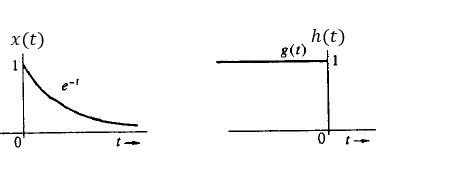So I have a convolution problem. I have two signals:

I need to find the output, y(t), through graphical convolution.
So I set the convolution integral up like this: $$ \int h(\tau)*x(t-\tau)d\tau $$
I set it up this way because I believed it easier to 'flip and slide' the exponential function than the unit step function. So, then I substituted in \$ h(\tau)\$ and \$x(t-\tau)\$ like so: $$ \int_{t-\inf}^{0} 1*e^{t-\tau}d\tau $$ This then gave me: $$ -e^{t-\tau}|_{t-\inf}^0 $$ Which equals \$-e^t\$. This is fine, and acceptable in my opinion. However, when moving to the next section, where the exponential is partially outside of the unit step function, I get issues. The equation I used here was this: $$ \int_{-\inf}^0e^{t-\tau}d\tau + \int_{t-\inf}^te^{t-\tau}d\tau $$ This includes the previous section from infinity to 0, and adds the new section, where the exponential has now moved partially outside of the step function, being bound by \$t-\inf\$, as before, and \$t\$. This then gives me this: $$ -e^{t-\tau}|_{-\inf}^0 + -e^{-t-\tau}|_{t-\inf}^t $$ This is where I start to have problems. \$-e^{t-\tau}|_{-\inf}^0\$ evaluates to: $$ -e^t + e^{t+\inf} $$ This is, of course, an issue, as \$e^{t+\inf}\$ is infinite, and cannot be used as it doesn't converge.
Is there a different way I can graphically convolve these two signals without running into issues with infinity?
Now, I have done this problem using \$h(t-\tau)\$ and \$x(\tau)\$. This runs into a similar issue. For the first section, where the step function is partially outside of the exponential, I get this: $$ \int_{-\inf}^0e^-td\tau $$ That evaluates to this: $$ -te^{-t} $$ Fine. Good. Now, when I do the next section, where the step function has passed \$\tau = 0\$, and now the limit of the step function is going along the curve of the exponential, I have this: $$ \int_{-\inf}^0e^{-t}d\tau + \int_0^te^{-t}d\tau $$ This evaluates to \$\tau e^{-t}|_{-\inf}^0+\tau e^{-t}|_0^t\$, or \$\inf +te^{-t}\$.
So I run into a similar issue to what I had had before.
So I decided to do this convolution using Laplace transforms. Since: $$ x(t) = e^{-t} $$ and $$ h(t) = u(-t) $$ I found these transformations: $$ H(s) = \frac1s; X(x) = \frac{1}{s+1} $$ Multiplying these, I find: $$ Y(s) = \frac{1}{s^2+1} $$
Applying an inverse Laplace Transform, I get: $$ y(t) = 1 - e^{-t} $$

\infty. \$\endgroup\$